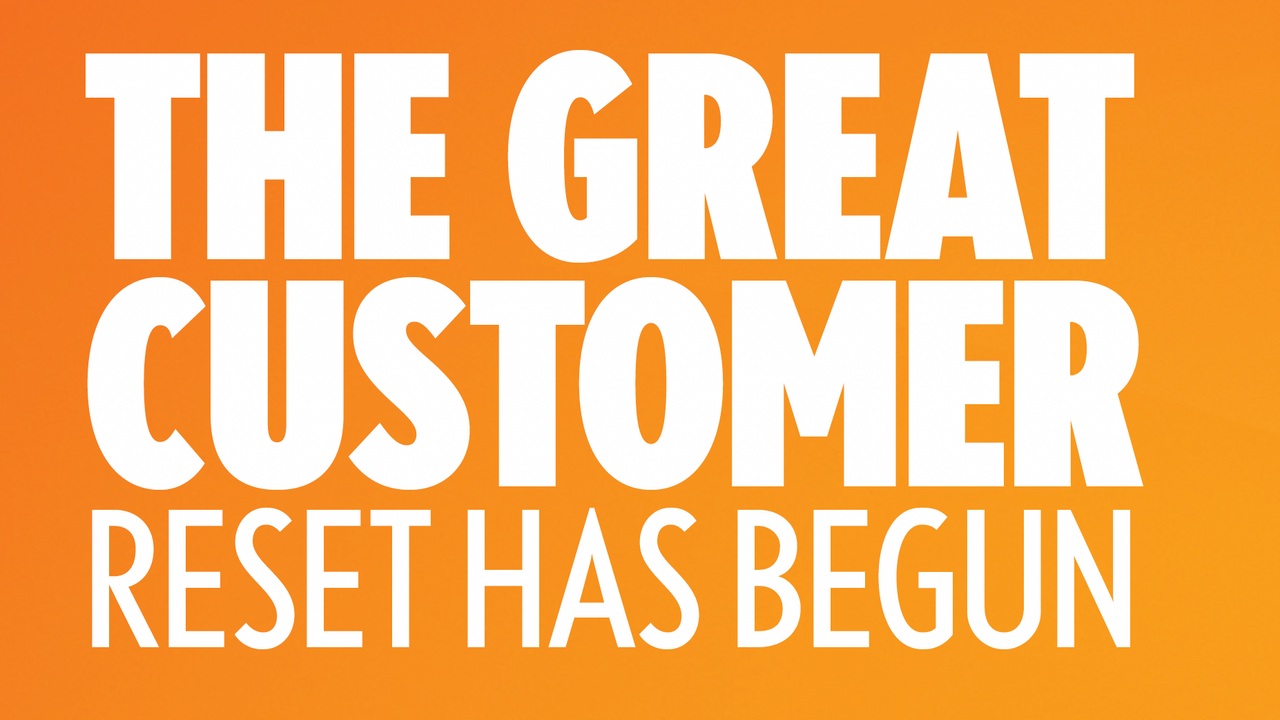The Great Customer Reset Has Begun

We are honored to share the latest article by Troy Korsgaden in the Finseca Focus magazine. This article centers around customers buying habits and expectations.
Link to full Finseca Focus magazine:
https://finseca.ygsclicbook.com/pubs/focus/2021/10/live/index.html
#InflectionPoint #DiscussionPartner #KorsgadenConsulting
To book a live presentation email: [email protected]
Today, customer experience matters more than ever, and there is no margin for error
By Troy Korsgaden
Today, customers have grown accustomed to the Amazon effect. They can read countless product reviews, browse endless options, order instantly, get free delivery, and return products easily. Customer buying habits and expectations have changed forever.
The great customer reset is now affecting the insurance and financial security profession from top to bottom. We must provide an unrivaled customer experience to thrive in the future. The goal is to be the one-stop source for all your customers' needs - even for insurance and financial security products you don't directly provide.
Think of this as the championship game, and we can- not make mistakes. We must provide flawless customer service and unrivaled customer experiences from the first quarter to the last. We cannot start by calling the wrong play, and we cannot fumble in the fourth quarter.
Subtle changes here and there aren't enough. We need to reset the entire customer experience across the enterprise and transform it into consistently unrivaled experiences that exceed customers' expectations.
A Single Misstep Can Cost Your Business a Valuable Customer
Anyone can provide great customer service, but today it's all about the experience. Every aspect of the experience must be flawless every time - regardless of with whom the customer is speaking - or customers will go somewhere else. Service is transactional; experiences are all-encompassing.
Let's say one of your financial professionals is delivering products and services to a household. The process of attracting the client was flawless; however, someone on the team dropped the ball during the onboarding process and created a negative experience for the new customer.
Or maybe the onboarding went well, the CRM worked flawlessly, and everyone on the team had the customer's vital information at their fingertips. The team made the appropriate follow-up calls, and the CEO sent a welcome letter. Every- thing goes great for a couple of years.
But when the customer's renewal comes up, no one reaches out.
Or maybe the customer has to submit a claim, and the process is slow and confusing. The customer is already in distress because of the situation that led to the claim, and now she feels like the company isn't doing its job - and it isn't.
Even though things might have gone well for the most part, the customer now has a negative view of doing business with the company - because of one misstep - and she is going to tell people about it.
It is distressing to see cases in which a current customer is ready to do more business with a carrier, agency, or firm- with the potential for premiums of $10,000, $50,000, $100,000, or even up to a half-million dollars - then someone in the enterprise butchers a $300 renewal on a simple umbrella policy, and the customer understandably takes his or her business somewhere else.
We cannot let that happen.
Here are three strategies for resetting the customer experience.
Key points
What’s happening: Because customers are in control today, carriers, firms, and agencies must provide unrivaled service at every touchpoint.
Perspective: The loyalty effect will not hold up unless we give our customers enough reasons to stay and enough reasons to buy more.
What to expect: Opportunities for creating unrivaled service lie in building consistent messages across the enterprise, automating manual tasks, and networking with experts in areas in which we don't specialize.
1. Get everyone on the same page.
The larger a company, firm, or agency is, the more difficult it is to ensure consistency in all communications with prospects and customers. If even one of the business units is not providing seamless, unrivaled service, the entire enterprise loses credibility. As they say, a chain is only as strong as its weakest link.
How can you get everyone on the same page? Here are three suggestions:
Anyone can provide great customer service, but today it’s all about the experience. Every aspect of the experience must be flawless every time — regardless of with whom the customer is speaking — or customers will go somewhere else.
- Script everything Create scripts for every imaginable conversation with prospects and customers. Everyone on the team, in every office, must be reinforcing the same message. That message must be 100% committed to providing an unrivaled, seamless, and flawless customer experience.
- Role-play potential customer scenarios. Require every team member to engage in role-playing during training sessions. Have them practice until their responses sound natural, not canned, and consistent with one another - and with your culture.
- Encourage feedback, even if — especially if — it isn’t positive. If someone anywhere across the enterprise has dropped the ball, you want to know so you can correct
it. You don't want to hear about it through someone else or read a terrible review about your business on platforms like Yelp. Then, when you discover and correct mistakes, communicate the lesson learned with everyone on the team so it doesn't happen again.
2. Automate manual processes where you can.
McKinsey predicts that, by 2025, the insurance profession has the potential to automate 25% of its Most of that automation potential comes from operational processes where robotic process automation, or RPA, can help by reducing the amount of time a team spends on repetitive tasks. UiPath, a company specializing in RPA, estimates that current RPA technology can save insurers 34% of employee time in data process- ing. More efficient teams and processes lead to fewer mistakes made during manual processing, quicker follow-up, fewer hassles, and happier customers.
RPA also is proving beneficial in streamlining claims registration and processing. RPA makes it much easier to handle the otherwise time-consuming collection of data from multiple sources, such as police reports, photos of damaged vehicles, and driver details.

3. Create a network of experts.
The world is too complex for us to specialize in every possible product, so we need to build networks of specialists who can. Today's customers want to work with financial professionals who can handle every insurance and financial security product imaginable. To do this requires that we network with all types of experts so we can provide a wide array of products.
When we become the facilitator and coordinator of every product possible, we develop a reputation as a valued "discussion partner."
For example, if a financial professional on your team has a client whose private jet has been damaged, find another professional specializing in aviation insurance and have them work together on the claim. You are not referring your customer to that expert; the two financial professionals are working together, and the customer is still working with your business.
Gone are the days of customers automatically buying or renewing products and services based on brand loyalty to their carrier, local agents, and professionals. The loyalty effect will not hold up unless we give our customers enough reasons to stay and enough reasons to buy more. Becoming a discussion partner is an effective way to accomplish that.
Troy Korsgaden is the principal of Korsgaden International, a company that specializes in the seamless distribution ecosystem, global marketing, strategy and execution, agency building and technology implementation for many of the world’s largest insurance carriers and financial services companies. The author can be reached at [email protected].


